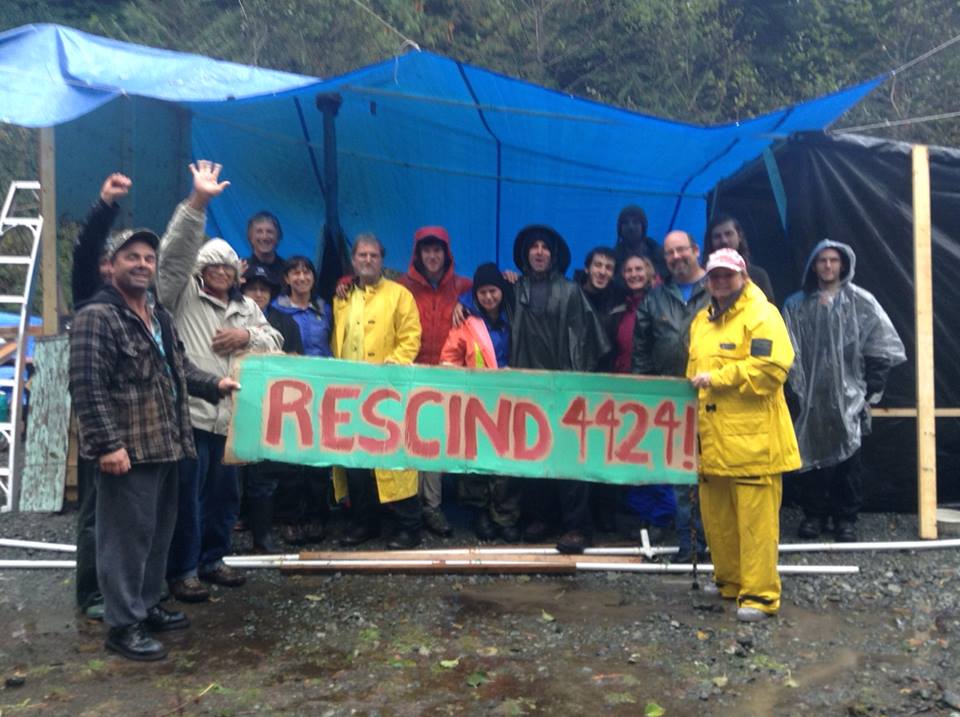Bobby Arbess aka Reuben Garbanzo / Friends of Carmanah/Walbran
Sixty years of logging have left only five percent of the primary low-elevation ancient temperate rainforests of Vancouver island remaining. These are some of the world’s most biologically productive forests, attaining higher levels of plant biomass than any ecosystem on earth. The logging industry liquidated the vast majority of these diverse native old-growth forest ecosystems, replacing them with even-aged monoculture tree plantations.
In 1991, 78 days of civil disobedience successfully halted 16 kilometres of scheduled road development through the last, expansive roadless ancient forest wilderness of the Walbran Valley on south Vancouver island. The Road Stops Here campaign combined prolonged tree-sits, road blockades, office occupations, street theatre, dramatic banner hangings, international support and massive public pressure to protect the land a few kilometres upstream from Canada’s iconic Pacific Rim National Park/West Coast Trail. This area is now known as ‘ground zero’ in British Columbia’s ancient forest movement, and a new battle is heating up.
The 16,000 hectare Carmanah/Walbran Provincial Park established in 1994 was a bittersweet victory for environmental activists who fought to save the valley’s ecologically outstanding ancient forests. The park boundaries were drawn up at a roundtable of stakeholders dominated by transnational forest companies owning timber licenses in the valley. The largest and oldest western redcedar trees in the world live at the confluence of three main branches of the watershed, at the heart of the wilderness now known as the Central Walbran Ancient Forest. The 485 hectares north of Walbran river, though designated a “special management zone”, was excluded from full park protection.
Twenty-five years of intense public scrutiny and regulatory provisions have limited “harvesting” to one cutblock in the Central Walbran Ancient Forest. The area is once again the focus of a direct action struggle to keep industrial destruction such as chainsaws, heli-logging and road building out of this wild rainforest of giant trees adjoining the park.
Ongoing road building on steep slopes of the unprotected land-base opens more and more old-growth remnants to clearcut logging. In reaction, there is a growing resurgence of public support, particularly in rural communities, for preserving the unfragmented wilderness of the Ancient Forest. Before a twelve-year government policy of shutting down local unionized mills in favour of raw log exports, the rural communities were based on thriving forestry towns. Now they watch the last massive trees pass their windows on the backs of the same log trucks which exported their livelihoods.
In June 2015, logging company Teal Jones submitted a plan for eight cutblocks in the area. With approval given for a heli-logging operation to high-grade cut a grove of 500-1200 year old trees, logging is now imminent in this pocket wilderness within the traditional Pacheedaht First Nations territory.
There is a slow-growing yet persistent expression of opposition to the logging within the indigenous community, to the chagrin of band council leaders. These leaders maintain a close relationship with the logging company and manage their own logging operations elsewhere in their territory, with plans to build and run a sawmill to generate jobs and revenues.
Many economic alternatives to continued old-growth logging are being proposed to address the high unemployment and poverty in the community:
- ethnocultural forest tourism
- harvesting of non-timber and other traditional forest products such as mushrooms, berries, and basketry materials
- ecologically-managed second growth plantations
- value-added production of finished wood products
- maximizing employment per cubic metre of wood and minimizing impacts on the land, waterways and biological diversity who depend on healthy and old-growth forests for their continued survival
The remaining old-growth forests of the Walbran valley harbor the highest concentrations of the Marbled Murrelet, an endangered seabird, anywhere outside of Alaska. The forests also shelter other old-growth dependent birds including the Western Screech owl, Western Pygmy owl, and Northern Goshawk, all listed by the Committee on the Status of Endangered Wildlife in Canada (COSEWIC) as vulnerable or threatened. Fifteen years of old-growth forest canopy research has revealed hundreds of species found nowhere else in the world, inhabiting suspended soil habitats of the forest canopy. These unique microhabitats are found as much as two hundred feet off the forest floor, and are not supported by second-growth forests.
Climate activists are now pointing out the critical ecological role these old forests play for the whole world in sequestering atmospheric carbon and buffering against runaway climate change.
The provincial government has ignored several requests to protect the area, including a petition card campaign of 6000 signatures presented in the legislature in September.
Activists built a witness camp in mid-September to host a continuous presence of observers watching for the start of logging in approved cutblock 4424. Others recently established a “checkpoint” action camp on a main road into the area. In autonomous actions of non-violent civil disobedience, they have erected sporadic road barricades denying access to logging and road-building crews. Company officials have requested that activists move their camp to allow for preparation of a large landing for loading logs onto trucks. So far the activists have not responded to this request and a confrontation in this area may be imminent.
The activists are calling for people to converge on Vancouver Island to observe, support, or participate in actions; make supporting donations through their website; contact BC residents and politicians; and spread the news of the threats and the resistance. They encourage members of the international community to join the Friends of Carmanah/Walbran Facebook group to stay in the loop of daily developments and to access action updates, relevant links and articles, road instructions, and carpool information.
The Friends of Carmanah/Walbran is a loose-knit community of people around the world sharing the passion, resources and collective action to protect this ancient forest, once and for all.
